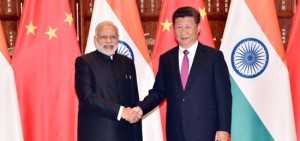 HANGZHOU (China): India has conveyed concerns to China over terrorism emanating from Pakistan-occupied Kashmir, the area encompassed by the controversial China-Pakistan Economic Corridor, and underscored the need for the two countries to be sensitive to each other’s aspirations, strategic interests and concerns.
HANGZHOU (China): India has conveyed concerns to China over terrorism emanating from Pakistan-occupied Kashmir, the area encompassed by the controversial China-Pakistan Economic Corridor, and underscored the need for the two countries to be sensitive to each other’s aspirations, strategic interests and concerns.
In his wide-ranging talks with China’s President Xi Jinping in the scenic eastern city of Hangzhou, India’s Prime Minister Narendra Modi raised the issue of terrorism emanating from CPEC, an ambitious trans-border project in which China has invested $46 billion. The issue was discussed, Vikas Swarup, the spokesperson of India’s external affairs ministry said in response to a question on the issue. He was briefing select Indian journalists Hangzhou, the venue of the G20 summit of the world’s major economies, after wide-ranging talks between the leaders of India and China.
India has protested many a time at the planned CPEC as parts of the proposed corridor that links China’s Xinjiang province with Gwadar port in Pakistan runs through Pakistan-occupied Kashmir, and hence amounts to impinging on the country’s sovereignty.
Will China support India’s NSG bid?
Against this backdrop, Mr Modi impressed upon the Chinese leader the need for “mutual respect for each other’s aspirations, strategic concerns and interests.” The Chinese leader also struck a conciliatory tone. “We ought to respect and give consideration to each other’s concerns, and use constructive methods to appropriately handle questions on which there are disputes,” Mr Xi said.
There was no explicit mention of India’s membership of the Nuclear Suppliers Group in official briefing by the Indian side, but reading between the lines it’s obvious that PM Modi was urging the Chinese leader to shed his opposition to New Delhi’s entry into the NSG. The message was obvious as China’s support for India’s global aspirations, including membership of the NSG and a permanent seat at the UN Security Council , will deconstruct the narrative of rivalry that has come to shadow the India-China relations. China’s opposition stalled India’s bid for the NSG membership at the Seoul plenary in June this year, and has escalated tensions between the two Asian giants.
The talks on the NSG appears to be progressing, with the two sides engaged in quiet diplomacy to find the way out. Last month, India and China launched a dialogue at the level of senior officials dealing with arms control issues, which is aimed primarily at addressing Beijing’s concerns over proliferation and eventually pave the way for India’s entry into the elite nuclear club.
Focus on terror
Condemning the terror attack on the Chinese embassy in Kyrgyz capital Bishkek, Mr Modi underscored the need for intensifying counter-terror cooperation between India and China. Our response to terrorism must not be politically motivated, PM Modi told Mr Xi, according to the spokesperson.
“Not just India, but countries like China, Russia and a number of others face the threat of terrorism emanating from our neighbourhood,” Mr Modi said.
The spokesperson underlined that the meeting was cordial as the two leaders stressed on enhanced cooperation in realizing the vision of an Asian Century. Taking a long-term strategic view, Mr Modi stressed that the development of India-China relations was not only in the interest of the two countries, but also for the region and the world.
This was the eighth meeting between Mr Modi and Mr Xi and signified their resolve to keep the sensitive bilateral relations on an even course despite a host of contentious issues.
Author Profile

- Manish Chand is Founder and Editor-in-Chief of India Writes Network (www.indiawrites.org) and India and World, a pioneering magazine focused on international affairs. He is CEO, Centre for Global India Insights, an India-based think tank focused on global affairs.
Latest entries
 India and the WorldFebruary 17, 2026South-by-South: Focus on people-centric solutions at India AI summit
India and the WorldFebruary 17, 2026South-by-South: Focus on people-centric solutions at India AI summit India and the WorldFebruary 7, 2026Modi hails interim India-US trade deal, Goyal says no concessions made on agriculture
India and the WorldFebruary 7, 2026Modi hails interim India-US trade deal, Goyal says no concessions made on agriculture India and the WorldFebruary 2, 2026Trump announces trade deal with India, Modi ‘delighted’
India and the WorldFebruary 2, 2026Trump announces trade deal with India, Modi ‘delighted’ India and the WorldJanuary 31, 2026Palestinian minister bats for mediatory role for India in ending Gaza conflict
India and the WorldJanuary 31, 2026Palestinian minister bats for mediatory role for India in ending Gaza conflict







